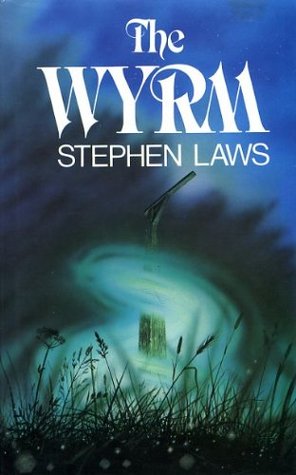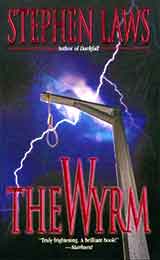 By STEPHEN LAWS (Souvenir Press; 1987)
By STEPHEN LAWS (Souvenir Press; 1987)
Fast, slick, action packed pulp horror by an author who really knows how to do this sort of thing. The British scribe Stephen Laws’ novels include GHOST TRAIN (1985), SPECTRE (1986) and DAEMONIC (1995), terrific reads all, and the same is true of THE WYRM, an unpretentious monster mash from the eighties that never got the attention it deserved (it didn’t even reach the US until 2004).
… an unpretentious monster mash from the eighties that never got the attention it deserved
The tiny English village of Shillingham is home to a number of quirky residents, along with a gibbet, an ancient wooden spike stuck in the ground. Frank Warwick, a bitter old widower, harbors a dark secret involving the spike and its true purpose. When the townspeople vote to tear down the gibbet Frank endeavors to stop the measure at any cost, even going so far as to fire gunshots at workmen in the act of removing it, all to no avail. As decreed, the gibbet is removed from the earth, revealing a deep pit and a skeletal corpse.
 And thus the Wyrm, a centuries old monstrosity, is unleashed. Its aims seem simple enough: to wreak as much destruction as it possibly can in a very short amount of time. Arrayed against it are a bevy of reasonably well characterized individuals, including the disturbed novelist Michael, the elderly coffee shop owner Iris, the youthful brother-sister team of Karen and Graham and the town psycho Billy. They nicely counterpoint the Wyrm, a terrifically delineated critter that Laws partners with a pair of monster canines for added mayhem in a climax that sees the entire village destroyed.
And thus the Wyrm, a centuries old monstrosity, is unleashed. Its aims seem simple enough: to wreak as much destruction as it possibly can in a very short amount of time. Arrayed against it are a bevy of reasonably well characterized individuals, including the disturbed novelist Michael, the elderly coffee shop owner Iris, the youthful brother-sister team of Karen and Graham and the town psycho Billy. They nicely counterpoint the Wyrm, a terrifically delineated critter that Laws partners with a pair of monster canines for added mayhem in a climax that sees the entire village destroyed.
A none-too-complex set-up, to be sure, but it’s related with admirable economy and beautifully paced…
A none-too-complex set-up, to be sure, but it’s related with admirable economy and beautifully paced (complete with lengthy excerpts from the ancient BOOK OF THE WYRM, whose moldy Olde English prose Laws convincingly renders). Its similarities to Ramsey Campbell’s HUNGRY MOON, published approximately a year earlier, must be counted as incidental, given that the two books appeared so close together. The novels do make for an intriguing comparison, though. Campbell’s effort, which also concerns an ancient monstrosity awakening after untold millennia to wreak havoc on a small English community, is a brooding affair with a paucity of action. Laws’ book, on the other hand, is slam-bang, unapologetic entertainment on a grand scale, and a satisfying read all around.
